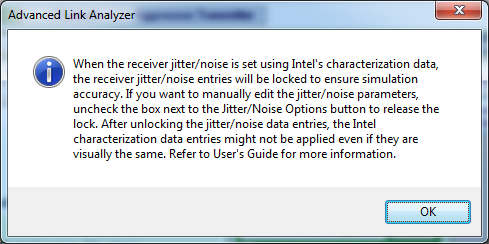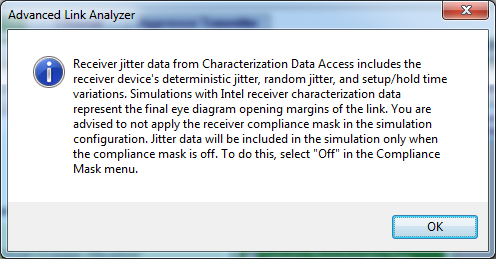Visible to Intel only — GUID: nik1412379592581
Ixiasoft
2.1.1. Constructing Communication Links in the Link Designer Module
2.1.2. Link and Simulation Setting
2.1.3. Transmitter Setting
2.1.4. Receiver Setting
2.1.5. IBIS-AMI Wrapper
2.1.6. Channel Setting
2.1.7. Batch Channel Simulation Configuration
2.1.8. Crosstalk Aggressor Transmitter Setting
2.1.9. Repeater and Retimer Configurations
2.1.10. Noise Source Link Component
2.1.11. System Options
2.1.12. Project Management Functions
2.1.13. Archiving and Unarchiving Projects
2.1.14. Device Model Importer
2.1.15. Analysis Functions and Pre-Simulation and Pre-Analysis Checklists
2.1.16. COM Analysis
Visible to Intel only — GUID: nik1412379592581
Ixiasoft
2.1.4.2. Characterization Data Access
You can retrieve the receiver jitter values from the built-in device characterization database. Advanced Link Analyzer supports Intel® Arria® 10 GX/SX/GT, Stratix® V GT, Stratix® V GX and Arria® V GZ characterization database access upon request. For devices supported by IBIS-AMI Wrapper Technology, jitter/noise models are provided by the IBIS-AMI models, and the wrapper determines the correct jitter/noise values associated with the link settings. If you need this capability, contact My Intel support.
Use the following guidelines for characterization data access:
- When Stratix® V GX, Stratix® V GT, Arria® V GZ or Intel® Arria® 10 GX/SX/GT is selected, the Characterization Data Access button appears and you can include the receiver jitter parameters in the simulation.
- Characterization Data Access covers PVT variations. You can select the appropriate process, voltage, and temperature conditions that best match the desired operation conditions.
- After clicking Characterization Data Access, Advanced Link Analyzer is configured to use the characterization data by:
- Setting Jitter/Noise Component Mode for characterization data entries
- Turning on the Jitter/Noise Data Lock
- Importing device characterization data based on the jitter unit selection
- RJ—Unit selection can be UI (RMS) or ps (RMS)
- Other Jitter—Unit selection can be UI (pk-pk), UI (pk), ps (pk-pk), or ps (pk)
The Advanced Link Analyzer simulation engine uses this characterization data from the database.
Note:
- Intel® Stratix® 10 receiver's jitter and noise values are sourced from the IBIS-AMI models or from user inputs per the IBIS-AMI model's documents.
- The characterization data is displayed in the text box for reference purposes. The Advanced Link Analyzer simulation engine uses proprietary algorithms to accurately model the jitter and noise in the simulations.
- You can unlock the jitter and noise contents by turning off the Jitter/Noise Data Lock. However, the jitter and noise models and values can be different from those when the Jitter/Noise Data Lock is turned on.
- Characterization Data Access is supported when the data rate is in the following range:
- Stratix® V GX: 5 Gbps to 14.1 Gbps
- Stratix® V GT: 19.6 Gbps to 28.1 Gbps
- Arria® V GZ: 5 Gbps to 14.1 Gbps
- Intel® Arria® 10 GX/SX: 3 Gbps to 17.4 Gbps
- Intel® Arria® 10 GT: 3 Gbps to maximum data rate specified in the data sheet
- After changing the link and device configurations, such as data rate, bandwidth, and PVT condition, you must update the jitter value by clicking Characterization Data Access.
- When the Jitter/Noise Data Lock is turned on, Advanced Link Analyzer examines whether the jitter data matches the simulation configuration during the following conditions:
- Start simulation
- Save link configuration
- In batch simulation mode, jitter data is retrieved and calculated based on the link configuration
When the link configuration exceeds the supporting range of Characterization Data Access, a warning message (conditions 1 and 2) is shown and jitter is reset (all conditions).
Figure 48. Characterization Data Access: PVT Conditions and Jitter/Noise Lock


Figure 49. Characterization Data Access Usage and Message


A message box appears when the Characterization Data Access button is clicked.
Figure 50. Intel Receiver Jitter Data Usage Message Window


Related Information